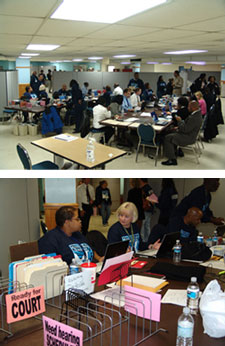
WASHINGTON, D.C. (FinalCall.com) – Non-violent criminals in the nation’s capital with arrest warrants recently avoided the sometimes violent and deadly risk that comes with being tracked down by U.S. Marshals by turning themselves in through the program “Fugitive Safe Surrender” held at Bible Way Church Nov. 1-3.
At Final Call press time, the Superior Court had 231 offenders who were wanted on past warrants to surrender, while 47 offenders with recent warrants making arrangements with court officials surrendered.
One individual flew to D.C. from New York City to surrender, and another turned himself in at the Bible Way Church the day before the program was set to begin.
Eric Dean walked from the suburbs to D.C. to turn himself in.
“I did it for my mother,” he explained. “I got a call from my PO (probation officer) that I had a warrant from 2005. Once you get on your feet, you want to stay on your feet, so I came in. My case was resolved on the spot, and now I have a clean slate.”
“I had faith, I took a chance and believed. When God knocks, you have to go through the door,” Mr. Dean shared.
That’s the mindset the program is trying to encourage in offenders.
“This was a win-win situation for everyone,” explained Leonard Sipes, Senior Public Affairs Director of the Court Services and Offender Supervision Agency (CSOSA) to The Final Call. “Offenders are extremely suspicious of the police. We talked to 60 offenders who said they would have welcomed this earlier in their criminal career if they could have done it in a church, mosque or synagogue to a minister, imam or rabbi, and if they could have brought their family members with them.”
“It’s a U.S. Marshals program in six other cities that has seen 6,000 people surrender. We used the faith community to help us do this. Offenders came in, we checked the status of their warrant, they were finger printed and processed, then they met with a defense attorney to assess their case,” he said.
Fugitive Safe Surrender is a national program of the U.S. Marshals Service and is being supported by the D.C. Criminal Justice Coordinating Council. It is considered a highly successful initiative that encourages persons wanted for non-violent felony or misdemeanor crimes to surrender voluntarily to faith-based leaders and law enforcement in a faith institution. Parole and probation violators are eligible for the program.
The program understands that many offenders are looking for a way out and provides an opportunity for those wanted for non-violent offenses to resolve their warrants and get on with their lives.
Surrendering within the confines of a church provides the assurance that they will be treated fairly and with dignity and respect.
Why surrender at a church?
CSOSA staff conducted interviews with offenders who surrendered at the Indianapolis Fugitive Safe Surrender event. The offenders indicated that they were looking for a way to start over. They reported that they were encouraged to surrender by their families. In fact, many were accompanied by their families to the church.
A series of interviews with current D.C. parolees and probationers supported the Indianapolis offender’s concerns. Several D.C. offenders indicated that the uncertainty associated with having an outstanding warrant discourages offenders from seeking jobs or job training and from participating in family activities out of fear of an encounter with law enforcement. They also indicated that offenders with outstanding arrest warrants often engage in additional criminal activity.
“It’s a good program that saves money and saves lives,” said U.S. Marshal Matthew Fogg to The Final Call. “A lot of money is spent to muster the manpower and investigate where offenders are living. If you can get folks to turn themselves in, it’s better.”
“When we have to go and get them, sometimes other people get involved. We have to go to their homes, sometimes with guns drawn. There are inherent risks involved with tracking people down. If we can get fugitives to turn themselves in, it’s better for everyone. The justice system is already bogged down.”
In addition to the non-violent offender being allowed to turn themselves in to a safe environment and having to avoid going to central booking, court and then maybe jail, participants in the program will receive, “favorable consideration,” for their case by a judge, explained Mr. Sipes.
According to Mr. Sipes, the program also helps many offenders return to a normal life. He said previous participants said they had avoided activities such as work or drug-treatment programs because they feared their warrants would be discovered.
Eligible participants had a parole or probation warrant in the District of Columbia, or an outstanding traffic warrant in the District of Columbia, were wanted in D.C. for a non-violent offense, had no history of violence and did not have an extensive criminal history.
They were not eligible if they had a juvenile, child neglect or child support case, a domestic violence warrant, or had a warrant from Maryland, Virginia or another jurisdiction or a court other than the D.C. Superior Court.
“This is a positive step towards community policing,” explained Mr. Fogg. “For offenders that are not considered a flight risk, they really benefited from the program. They can void the fear of dealing with the police. They won’t be brutalized or beat up in the marshal’s efforts to arrest them.”
The last Safe Surrender program held in July, in Akron, Ohio, brought in 1,600 offenders over four days.












